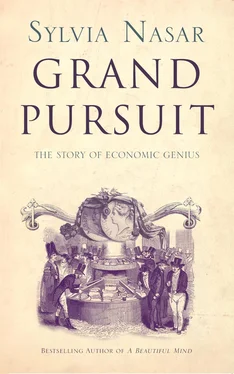One might think that his family’s climb from renters of rooms over a store to rate-paying owners of a London town house would have made Marx uneasy about his theory. In the twenty years since he had set out to prove that capitalism could not work, Marx himself had evolved from bohemian to bourgeois. He no longer favored the immediate abolition of the rights of inheritance in the Communist program. 116The Marxes used one of several legacies to trade their “old hole in Soho” for an “attractive house” in one of the new middle-class developments near Hampstead Heath. It was so new that they found there was no paved road, no gas street lights, and no omnibuses; only heaps of rubbish, piles of rock, and mud.
Marx often said that there was something rotten about a system that increased wealth without reducing misery, yet it did not seem to strike him that misery can sometimes increase with wealth. He assumed that London’s slums, which were becoming more Dickensian with each passing decade, were proof that the economy couldn’t deliver a decent standard of living for ordinary people. On the contrary, explains Gareth Stedman Jones, the housing crisis was an unwelcome by-product of London’s helter-skelter growth, growing prosperity, and voracious demand for unskilled labor. The key fact is that the mid-Victorian building frenzy involved an orgy of demolition. Between 1830 and 1870, thousands of acres in central London were cleared, mostly in the poor districts where land was cheap, to expand the London docks, lay railway lines, build New Oxford Street, dig the sewers and water pipes, and, in the 1860s, excavate the first stretches of the London tube. So, just as tens of thousands of migrants were flocking to the city in search of work, the supply of housing within walking distance of London’s industrial areas was plummeting. As a result, workers were crowded into ever more dilapidated, ever tighter, ever more expensive quarters. Once the demolition stopped and white-collar workers began to commute from the suburbs by rail, the housing crisis began to ease.
The Exhibition season of 1862 coincided with another low point in Marx’s financial affairs. Horace Greeley, the publisher of the New York Tribune, had dropped his column, which, though entirely ghostwritten by Engels, had supplied Marx with extra cash. At one point, his money woes became so dire that he applied for a job as a railway clerk, only to be rejected for “bad handwriting” and not speaking English, and briefly considered immigrating to America. Luckily, he was like an oyster that needed a bit of grit to make his pearls. With his mind on money, he was soon writing a long essay on economics and filling up notebooks again, complaining all the while that he felt like “a machine condemned to devour books and then throw them, in a changed form, on the dunghill of history.” 117He also decided on a title for his great work: Das Kapital. 118
The hoopla surrounding the Exhibition continued to depress Marx. He would have sympathized with Fyodor Dostoyevsky’s reaction; the Russian novelist called the glass palace “a Biblical sight, something to do with Babylon, some prophecy out of the Apocalypse being fulfilled before your very eyes.” 119Yet within a year or two, Marx’s fortunes turned up again. Thanks to several unexpected legacies as well as a £375 annual subsidy from Engels, he was able to move his family to an even bigger and more imposing town house and was soon spending £500 to £600 a year, something that more than 98 percent of English families could not afford to do. 120
Marx had almost forgotten about the Day of Judgment when it dawned.
The launch of the eleven-thousand-ton warship the HMS Northumberland on April 17, 1866, ought to have been a day of pride, a reminder of Great Britain’s industrial and commercial domination of the world. Instead it was a fiasco. The Northumberland had been on the slips in the Millwall Iron Works yard for nearly five years. On the day of the launch, her unusually heavy weight caused her to slip off the railing—a portent, people understood later, of the precarious condition of the shipping firms and shipbuilders.
Less than a month later, on Thursday afternoon, May 10, in the first week of the London boating season, a frightful rumor swirled through the city. The Rolls-Royce of merchant banks, Overend, Gurney & Company, considered by the average citizen to be as solid as the Royal Mint, had failed. “It is impossible to describe the terror and anxiety which took possession of men’s minds for the remainder of that and the whole of the succeeding day,” wrote the London Times’s financial correspondent. “No man felt safe.” By ten o’clock the following morning, a horde of “struggling and half frantic creditors” of both sexes and seemingly all stations of life invaded the financial district. “At noon the tumult became a rout. The doors of the most respectable Banking Houses were besieged . . . and throngs heaving and tumbling about Lombard Street made that narrow thoroughfare impassable.” 121
The New York Times bureau chief dashed off a telegram to his editors to convey that this was “a more fearful panic than has been known in the British metropolis within the memory of man.” Before an extra battalion of constables could be called out to control the crowd and before the Chancellor of the Exchequer could authorize the suspension of the Bank Charter Act, the Bank of England had lost 93 percent of its cash reserves, the British money market was frozen solid, and scores of banks and businesses that lived on credit were facing ruin. “Englishmen have been running mad on speculation . . . The day of reckoning has arrived and blank panic and blue dismay sit on the faces of all our bankers, capitalists and merchants.” 122
Among the first victims of the panic were the owners of the Millwall shipyard. The boom in shipbuilding, fueled by a worldwide arms race and trade, had more than doubled employment in London shipyards between 1861 and 1865. 123“The magnates of this trade had not only over-produced beyond all measure during the overtrading time, but they had, besides, engaged in enormous contracts on the speculation that credit would be forthcoming,” Marx gloated. 124
By the time of the Overend collapse, new orders were drying up. In fact, Overend may have been pushed over the edge because “they covered the seas with their ships” and “were incurring huge losses on their fleet of steamships.” Other casualties included the legendary railway contractors Peto and Betts. True, the most immediate victims of the panic were gullible investors and “countless swindling companies” that had sprung up to take advantage of cheap money. But the crisis of confidence forced the Bank of England to raise its benchmark interest rate from 6 percent to a crushing 10 percent, “the classic panic rate,” 125which persisted through the summer. A play called One Hundred Thousand Pounds closed after a brief run. The Times didn’t even bother to review it. The boom was over.
When news of Black Friday reached Marx via his afternoon paper, he was in his study in North London pondering a financial crisis closer to home. One Modena Villas, where he and his family had recently moved, was a pretentious affair of the kind sprouting up all over London’s periphery, far too pricey for an unemployed journalist who had long since stopped accepting assignments in order to finish his book. Marx had rationalized the extravagance as necessary for his teenage daughters “to establish themselves socially.” Now, alas, he was broke again and his rent was overdue. So, unfortunately, was Das Kapital.
For nearly fifteen years, Marx had been assuring his best friend and patron that his grandiose “Critique of Political Economy” was “virtually finished, that he was ready to “reveal the law of motion of modern society,” that he would drive a stake through the heart of English “political economy.” Now Engels, who had kept his nose to the grindstone in Manchester for fifteen years to support him, was becoming restive.
Читать дальше












